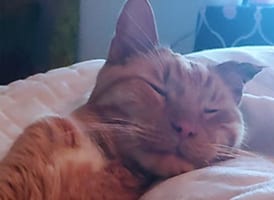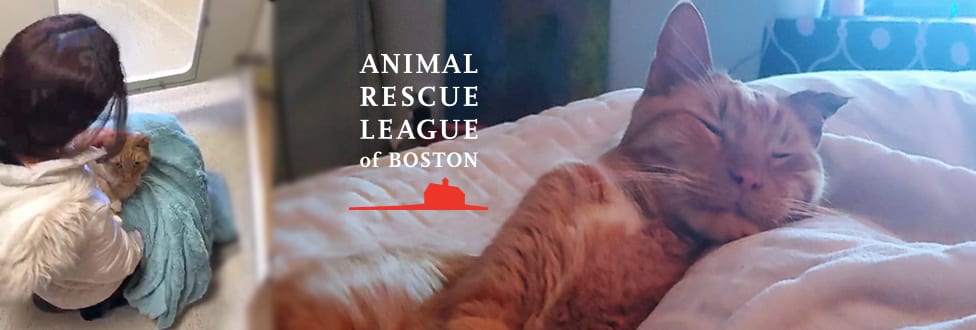Press Release: Microchip Helps Reunite Lost Cat with Owners
Family notified of cat being found on Valentine’s Day
The Animal Rescue League of Boston (ARL) is once again reminding the public of the importance of having pets microchipped – this after recently reuniting a Stoughton, MA, family with their cat who went missing shortly before Christmas.
Four-year-old Tigger snuck out of his Stoughton home on December 23, 2018, to explore the outdoors. Perhaps spooked by his surroundings, Tigger ran when his owners tried to get him back inside and unfortunately did not return.
In the following days and weeks, Tigger’s family posted the cat’s picture on social media and posted flyers in their neighborhood and nearby businesses – but still Tigger was not found.

Tigger back in the comforts of home but with a reminder of the elements — note the frostbite on his left ear.
On February 10, a local resident brought a stray cat to ARL’s Dedham Animal Care and Adoption Center. The cat was emaciated, dehydrated, and had suffered from frostbite on its left ear and front paw due to long-term exposure to the elements.
The cat received fluids and was checked by ARL staff and was also scanned for a microchip. The chip was registered to a Florida resident, however after a little detective work, ARL tracked the owner from Florida to Stoughton.
A certification letter was sent to the Stoughton address, and owner Jackie Rhone tells ARL the cat was originally a gift for her 17-year-old daughter, and after two months had given up any hope of finding Tigger.
“That evening (Valentine’s Day) we went out for an errand and when we returned home my husband checked the mail, and when he came inside he screamed “read this Jackie quick”! I started reading it out loud with tears rolling down my face and said “they found our Tigger!”’, Rhone said.
Tigger was reunited with his family two days later and is now strictly an indoor cat.
This reunion would not have been possible if Tigger hadn’t been microchipped.
A Permanent ID
A microchip is a computer chip about the size of a grain of rice, programmed with an identification number unique to your pet. It is non-toxic, non-allergenic, and will last the life of your pet with no maintenance required.
A microchip greatly increases the likelihood of being reunited with a lost pet – an AVMA study shows 52 percent of dogs with microchips are reunited with owners, versus just 21 percent with dogs with no microchip. Owner return rates for cats with microchips is 38 percent versus 1.8 percent for cats without the chip.
ARL recommends pet owners to ensure their animal is microchipped, and to also keep contact information up to date.

